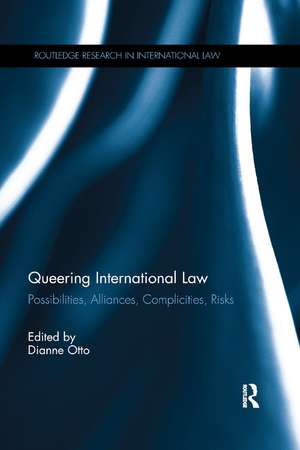Queering International Law: Possibilities, Alliances, Complicities, Risks: Routledge Research in International Law
Editat de Dianne Ottoen Limba Engleză Paperback – 12 dec 2019
The contributors to the book use queer legal theory to critically analyse the basic tenets and operations of international law, with many surprising, thought-provoking and instructive results. The volume will be of interest to many scholars, students and researchers in international law, international relations, cultural studies, gender studies, queer studies and postcolonial studies.
Din seria Routledge Research in International Law
-
 Preț: 296.43 lei
Preț: 296.43 lei -
 Preț: 151.73 lei
Preț: 151.73 lei -
 Preț: 311.94 lei
Preț: 311.94 lei -
 Preț: 311.70 lei
Preț: 311.70 lei - 8%
 Preț: 375.14 lei
Preț: 375.14 lei -
 Preț: 281.27 lei
Preț: 281.27 lei - 18%
 Preț: 1053.16 lei
Preț: 1053.16 lei -
 Preț: 484.47 lei
Preț: 484.47 lei -
 Preț: 282.62 lei
Preț: 282.62 lei -
 Preț: 410.50 lei
Preț: 410.50 lei - 18%
 Preț: 1054.75 lei
Preț: 1054.75 lei - 18%
 Preț: 727.38 lei
Preț: 727.38 lei -
 Preț: 422.04 lei
Preț: 422.04 lei - 18%
 Preț: 1054.71 lei
Preț: 1054.71 lei - 18%
 Preț: 1074.44 lei
Preț: 1074.44 lei - 18%
 Preț: 1059.48 lei
Preț: 1059.48 lei - 18%
 Preț: 1060.52 lei
Preț: 1060.52 lei - 18%
 Preț: 1058.43 lei
Preț: 1058.43 lei -
 Preț: 452.27 lei
Preț: 452.27 lei -
 Preț: 451.41 lei
Preț: 451.41 lei -
 Preț: 419.11 lei
Preț: 419.11 lei - 28%
 Preț: 822.34 lei
Preț: 822.34 lei -
 Preț: 494.07 lei
Preț: 494.07 lei - 18%
 Preț: 1118.46 lei
Preț: 1118.46 lei -
 Preț: 491.60 lei
Preț: 491.60 lei -
 Preț: 490.25 lei
Preț: 490.25 lei - 18%
 Preț: 1178.15 lei
Preț: 1178.15 lei -
 Preț: 444.62 lei
Preț: 444.62 lei - 18%
 Preț: 1050.78 lei
Preț: 1050.78 lei -
 Preț: 454.22 lei
Preț: 454.22 lei - 14%
 Preț: 301.05 lei
Preț: 301.05 lei -
 Preț: 419.32 lei
Preț: 419.32 lei - 18%
 Preț: 1052.38 lei
Preț: 1052.38 lei - 18%
 Preț: 1111.87 lei
Preț: 1111.87 lei - 18%
 Preț: 1112.34 lei
Preț: 1112.34 lei - 15%
 Preț: 550.99 lei
Preț: 550.99 lei - 18%
 Preț: 1054.71 lei
Preț: 1054.71 lei -
 Preț: 422.91 lei
Preț: 422.91 lei -
 Preț: 286.51 lei
Preț: 286.51 lei - 18%
 Preț: 1117.88 lei
Preț: 1117.88 lei
Preț: 393.93 lei
Nou
Puncte Express: 591
Preț estimativ în valută:
75.40€ • 81.39$ • 63.22£
75.40€ • 81.39$ • 63.22£
Carte tipărită la comandă
Livrare economică 18 aprilie-02 mai
Preluare comenzi: 021 569.72.76
Specificații
ISBN-13: 9780367886370
ISBN-10: 0367886375
Pagini: 304
Dimensiuni: 156 x 234 x 16 mm
Greutate: 0.56 kg
Ediția:1
Editura: Taylor & Francis
Colecția Routledge
Seria Routledge Research in International Law
Locul publicării:Oxford, United Kingdom
ISBN-10: 0367886375
Pagini: 304
Dimensiuni: 156 x 234 x 16 mm
Greutate: 0.56 kg
Ediția:1
Editura: Taylor & Francis
Colecția Routledge
Seria Routledge Research in International Law
Locul publicării:Oxford, United Kingdom
Public țintă
Postgraduate and UndergraduateCuprins
Introduction Embracing Queer Curiosity Dianne Otto Part I Complicities: Sexuality, Coloniality and Governance 1. A Tale of Two Atonements Rahul Rao 2. ‘Dangerous Desires’: Illegality, Sexuality, and the Global Governance of Artisanal Mining Doris Buss and Blair Rutherford 3. The Anatomy of Neoliberal Internet Governance: A Queer Critical Political Economy Perspective Monika Zalnieriute Part II Possibilities: Rethinking Violence, War and Law 4. International Law as Violence: Competing Absences of the Other Vanja Hamzić 5. The Maintenance of International Peace and Security Heteronormativity Tamsin Phillipa Paige 6. In Spite: Testifying to Sexual and Gender Based Violence during the Khmer Rouge period Maria Elander Part III Alliances: Making Queer Lives Matter 7. The Im/possibility of Queering Human Rights Ratna Kapur 8. Homoglobalism: The Emergence of Global Gay Governance Aeyal Gross 9. Governing (Trans)Parenthood – The Tenacious hold of Biological Connection and Heterosexuality Anniken Sørlie Part IV Risks: Troubling Statehood, Sovereignty and its Borders 10. Queer Border Crossers: Pragmatic Complicities, Indiscretions and Subversions Bina Fernandez 11. Queering International Law’s Stories of Origin: Hospitality and Homophobia Nan Seuffert 12. Resisting the Heteronormative Imaginary of the Nation State: Rethinking Kinship and Border Protection Diane Otto
Notă biografică
Professor Dianne Otto held the Francine V McNiff Chair in Human Rights Law at the University of Melbourne Law School, Australia, 2013–2016. She is currently a Professorial Fellow at Melbourne Law School.
Descriere
Beyond the push in the human rights field to ensure respect for the rights of people with diverse sexual orientations and gender identities, queer legal theory provides a means to examine the structural assumptions and conceptual architecture that underpin the normative framework and operation of international law, highlighting bias and blind sp
